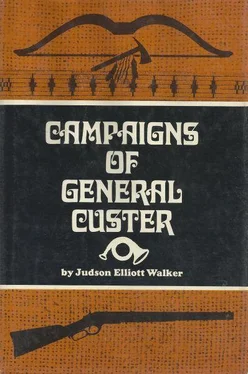Walker Array - Campaigns of General Custer in the North-west, and the final surrender of Sitting Bull
Здесь есть возможность читать онлайн «Walker Array - Campaigns of General Custer in the North-west, and the final surrender of Sitting Bull» весь текст электронной книги совершенно бесплатно (целиком полную версию без сокращений). В некоторых случаях можно слушать аудио, скачать через торрент в формате fb2 и присутствует краткое содержание. Жанр: Историческая проза, Исторические приключения, Приключения про индейцев, на английском языке. Описание произведения, (предисловие) а так же отзывы посетителей доступны на портале библиотеки ЛибКат.
- Название:Campaigns of General Custer in the North-west, and the final surrender of Sitting Bull
- Автор:
- Жанр:
- Год:неизвестен
- ISBN:нет данных
- Рейтинг книги:5 / 5. Голосов: 1
-
Избранное:Добавить в избранное
- Отзывы:
-
Ваша оценка:
- 100
- 1
- 2
- 3
- 4
- 5
Campaigns of General Custer in the North-west, and the final surrender of Sitting Bull: краткое содержание, описание и аннотация
Предлагаем к чтению аннотацию, описание, краткое содержание или предисловие (зависит от того, что написал сам автор книги «Campaigns of General Custer in the North-west, and the final surrender of Sitting Bull»). Если вы не нашли необходимую информацию о книге — напишите в комментариях, мы постараемся отыскать её.
Campaigns of General Custer in the North-west, and the final surrender of Sitting Bull — читать онлайн бесплатно полную книгу (весь текст) целиком
Ниже представлен текст книги, разбитый по страницам. Система сохранения места последней прочитанной страницы, позволяет с удобством читать онлайн бесплатно книгу «Campaigns of General Custer in the North-west, and the final surrender of Sitting Bull», без необходимости каждый раз заново искать на чём Вы остановились. Поставьте закладку, и сможете в любой момент перейти на страницу, на которой закончили чтение.
Интервал:
Закладка:
Notwithstanding great excitement on the part of the assembled braves, the arrest was effected in safety, and Rain-in-the-Face was conveyed, under escort of Captain T. W. Custer – brother of Lieutenant-Colonel Custer – to Fort Lincoln. Here he fully confessed his crime, and remained a prisoner in the guard-house at Lincoln until the incarceration of the suspected grain thieves and their escape gave him his liberty.
Rain-in-the-Face went directly to the hostile camp, and attaching himself to the band of Sitting Bull, was joined by his followers, and sent frequent messages by the Agency Indians-who paid them frequent visits of friendship and business-that he was ardently awaiting an opportunity to be revenged on Lieutenant-Colonel Custer and Captain Custer, for his imprisonment.
In the spring of 1876 it was determined by the Government to attempt the subjugation of Sitting Bull and the lawless tribes under him, who had refused to accede to the provisions of the treaty of 1868, and had since led a wandering life. Their numbers augmented each spring by frequent accessions*of warriors, and supplies of war irom the Missouri River Agencies. From their stronghold at the headwaters of the Yellowstone, war parties were continually sent out to annoy the white settlements.
Their camp formed a convenient retreat for disaffected Agency Indians. Criminals and unruly spirits, supported by the Government through the winter, were ready in the summer to join the hostiles, conveying to them arms, ammunition, ponies and supplies. Thus the problem of dealing with the professedly peaceful Indians was greatly complicated.
The only way to end the constantly-recurring troubles, and prevent a general uprising of the whole body of Indians -many of them already on the war-path, resentful at the violation of the treaty of 1868-was to strike a decisive blow directly at the headquarters of the savage tribes, and by breaking up their rendezvous in the Yellowstone region, compel them to return and surrender at the various Agencies on the Missouri River.
With this object in view, the expedition of 1876 was planned. It was arranged that three expeditions should start simultaneously for the headwaters of the Yellowstone-one from the north, one from the south, and one from the east- the three to join forces and co-operate in the region constituting the objective point of their converging marches.
The column from the south, under General Crook, started from Fort Fetterman, Wyoming Territory, May 29th, 1876, and marched due north for the Powder River country. It was composed of 1,300 men, and arrived at old Fort Reno June 3d. It succeeded in reaching the indicated ground, viz., the valley of the Yellowstone, drained by its tributaries, the Big Horn, Rosebud, Tongue and Powder Rivers, together with their branches, and at one time was within one hundred miles of the northern column; but the Indians were between them, and after several heavy skirmishes, in which the troops were defeated, it fell back to the head of Tongue Biver, and from there returned ingloriously to its starting place.
The force from the north, under Colonel Gibbon, left Fort Ellis, Montana, with a strength of four hundred men, and wagon train, marched due east, and joined the force from the east under General Terry, June 1st.
The departure of the column from the east, which, in the original plan of the campaign, was to have been led by Lieutenant-Colonel Custer, had been delayed, in consequence of Custer having been called to Washington to give evidence before the Congressional Committee then engaged in investigating charges against Secretary of War Belknap. Like all army officers stationed on the frontier, Custer was conversant with the terrible corruption of the Interior Department, displayed in the management of the Indian Agencies and trading posts. As an honest man, he did what many others, better informed than himself, but more devoted to self-interest, had not dared to do-spoke aloud his convictions. Custer's testimony-and the fact that he had presumed to hold opinions on the subject-was distasteful to Belknap's friend, U. S. Grant, President of the United States, and brother of Orville Grant, a post-trader of precious memory on the Missouri Biver.
CHAPTER III
Origin of the Breach between Belknap and Custer.
Inasmuch as there are but very few people in the country, even among those holding official positions in the army, and in military circles outside, comprehend f lly the causes that led the Belknap tradership business to such a sudden " burst of the bubble," the author thinks it proper, in connection with the foregoing history, to state here fully the facts as they came under his observation at the time of their occurrence. Several m amp;nths before the high court of impeachment was ordered to investigate the tradership business
of Secretary of War Belknap, there was, in one of the regiments belonging to the United States Army, a young officer who was placed under arrest in consequence of charges preferred against him. He was tried by court-martial, and by a preponderance of evidence against him, and an unfortunate combination of circumstances, was found guilty and sentenced to dismissal from the service of the United States. It was, however, generally considered among those conversant with the affair, that the charges originally preferred against him were frivolous, and were created and brought against him more from personal malice than from any zeal for the service on the part of his accusers. Through the regular military channels, the findings and sentence of the court-martial reached Secretary Belknap for his approval or disapproval. It was thought in army circles that the Secretary should have shown some leniency, and been governed by the precedents on record at the War Office in similar cases, at the time. A commutation of the sentence to suspension from rank and half pay for six or twelve months was confidently expected by the friends of the aforesaid delinquent officer, and would have been considered a reasonable punishment for the offense charged. Contrary to popular expectation, the sentence of the court was promptly confirmed by the Secretary of War, and the young officer left the service of the United States army in disgrace, but only to return in due time. He, however, immediately set himself to work to procure his reinstatement by a special act of Congress ; but the approval of the findings and sentence of the court-martial by Secretary Belknap, of course, made a very strong case against him. In the meantime, the young officer, who, while in the service, had excellent opportunities to observe the manner in which the tradership traffic was carried on under the Belknap rule, set himself to work collecting facts and evidence concerning the same, and by means of these, prevailed upon his friends in Congress to bring the matter before the proper committee. This was done, and the result was a high court of impeachment. The Secretary of War was arraigned at the bar of the U. S. Senate to answer the grave charges preferred against him, and only escaped the righteous verdict of an indignant nation by a hasty resignation, and as hasty an acceptance of the same by President Grant, of his high office. We may add in this connection, that the young officer who first set in motion the much needed investigation, was afterward reinstated to his place in the army, and assumed his former rank in the service.
Another matter upon which the people of the country, even those of high standing, both in civil and military life, are not enlightened, is the causes' that led to the ill-feeling existing between Grant and Belknap on the one side against General G. A. Custer on the other. It was previously a matter of record, and known all over the country, that Grant, Sherman and Sheridan were not only intimate friends and admirers of General Custer, but that they placed unlimited confidence in his fighting abilities and military skill.
Читать дальшеИнтервал:
Закладка:
Похожие книги на «Campaigns of General Custer in the North-west, and the final surrender of Sitting Bull»
Представляем Вашему вниманию похожие книги на «Campaigns of General Custer in the North-west, and the final surrender of Sitting Bull» списком для выбора. Мы отобрали схожую по названию и смыслу литературу в надежде предоставить читателям больше вариантов отыскать новые, интересные, ещё непрочитанные произведения.
Обсуждение, отзывы о книге «Campaigns of General Custer in the North-west, and the final surrender of Sitting Bull» и просто собственные мнения читателей. Оставьте ваши комментарии, напишите, что Вы думаете о произведении, его смысле или главных героях. Укажите что конкретно понравилось, а что нет, и почему Вы так считаете.












